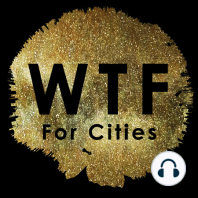8 min listen

008R_What are the differences between sustainable and smart cities? (research summary)
008R_What are the differences between sustainable and smart cities? (research summary)
ratings:
Length:
10 minutes
Released:
Oct 18, 2021
Format:
Podcast episode
Description
Summary of the article titled What are the differences between sustainable and smart cities from 2017 by Hannele Ahvenniemi, Aapo Huovila, Isabel Pinto-Seppä and Miimu Airaksinen.
Since this podcast investigates different futures for the cities, I thought it would be beneficial to look at the potential differences between two popular urban futures. This article gives an insight into city assessment tools regarding smartness and sustainability in urban areas and a recommendation to use smart sustainable cities as a more appropriate term for the future of cities.
You can find the article through this link.
Abstract: City assessment tools can be used as support for decision making in urban development as they provide assessment methodologies for cities to show the progress towards defined targets. In the 21st century, there has been a shift from sustainability assessment to smart city goals. We analyze 16 sets of city assessment frameworks (eight smart city and eight urban sustainability assessment frameworks) comprising 958 indicators altogether by dividing the indicators under three impact categories and 12 sectors. The following main observations derive from the analyses: as expected, there is a much stronger focus on modern technologies and “smartness” in the smart city frameworks compared to urban sustainability frameworks. Another observation is that as urban sustainability frameworks contain a large number of indicators measuring environmental sustainability, smart city frameworks lack environmental indicators while highlighting social and economic aspects. A general goal of smart cities is to improve sustainability with help of technologies. Thus, we recommend the use of a more accurate term “smart sustainable cities” instead of smart cities. However, the current large gap between smart city and sustainable city frameworks suggest that there is a need for developing smart city frameworks further or re-defining the smart city concept. We recommend that the assessment of smart city performance should not only use output indicators that measure the efficiency of deployment of smart solutions but also impact indicators that measure the contribution towards the ultimate goals such as environmental, economic or social sustainability.
The transcript is available through this link.
What wast the most interesting part for you? What questions did arise for you? Let me know on twitter @WTF4Cities!
I hope this was an interesting episode for you and thanks for tuning in.
Music by Lesfm from Pixabay
Since this podcast investigates different futures for the cities, I thought it would be beneficial to look at the potential differences between two popular urban futures. This article gives an insight into city assessment tools regarding smartness and sustainability in urban areas and a recommendation to use smart sustainable cities as a more appropriate term for the future of cities.
You can find the article through this link.
Abstract: City assessment tools can be used as support for decision making in urban development as they provide assessment methodologies for cities to show the progress towards defined targets. In the 21st century, there has been a shift from sustainability assessment to smart city goals. We analyze 16 sets of city assessment frameworks (eight smart city and eight urban sustainability assessment frameworks) comprising 958 indicators altogether by dividing the indicators under three impact categories and 12 sectors. The following main observations derive from the analyses: as expected, there is a much stronger focus on modern technologies and “smartness” in the smart city frameworks compared to urban sustainability frameworks. Another observation is that as urban sustainability frameworks contain a large number of indicators measuring environmental sustainability, smart city frameworks lack environmental indicators while highlighting social and economic aspects. A general goal of smart cities is to improve sustainability with help of technologies. Thus, we recommend the use of a more accurate term “smart sustainable cities” instead of smart cities. However, the current large gap between smart city and sustainable city frameworks suggest that there is a need for developing smart city frameworks further or re-defining the smart city concept. We recommend that the assessment of smart city performance should not only use output indicators that measure the efficiency of deployment of smart solutions but also impact indicators that measure the contribution towards the ultimate goals such as environmental, economic or social sustainability.
The transcript is available through this link.
What wast the most interesting part for you? What questions did arise for you? Let me know on twitter @WTF4Cities!
I hope this was an interesting episode for you and thanks for tuning in.
Music by Lesfm from Pixabay
Released:
Oct 18, 2021
Format:
Podcast episode
Titles in the series (100)
019R_How the car transformed society in the 20th century? (research summary) by What is The Future for Cities?